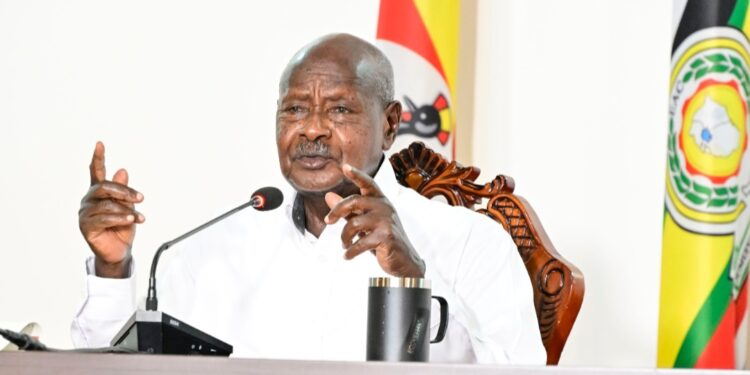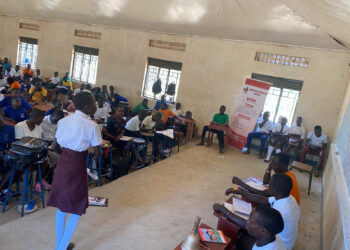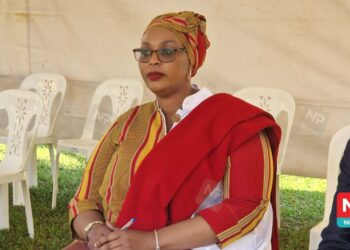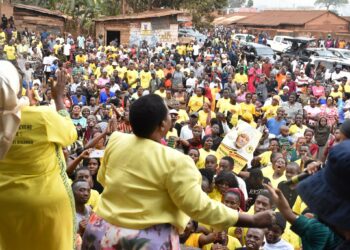A day ago, a letter surfaced bearing President Yoweri Museveni’s signature, urging for a comprehensive investigation into the allocation of Shs 1.7bn among Parliamentary Commissioners, including Leader of the Opposition Mathias Mpuuga, purportedly as service awards.
The single-page letter, now labelled as “Fake or Forged,” dated May 3rd, raised questions from the President to the Attorney General, Mr Kiryowa Kiwanuka, regarding the alleged service award shared among four MPs during a meeting on May 6th, 2022. This meeting purportedly took place in the Parliamentary Commission’s 96th Boardroom, chaired by House Speaker Anita Among, precisely at 10 am.
“I have been following the public debate on the service awards given to the Leader of the Opposition in Parliament and what you call back-bench Parliamentary Commissioners……Were you aware of these ‘awards’? Or the Attorney General does not need to know about this. If you were aware, did you advise that it was legal?..” reads part of the fake letter.
“The moral question is settled. Such conduct is contrary to the revolutionary principles of the NRM. When we were fighting Obote and Amin, we used to call it a primitive accumulation of wealth. Why? Officials under those regimes were trying to get for themselves as much money as possible in the quickest time possible, in the easiest way possible,” it added.
“We used to ask them, “Where does this leave your country?” he added, before revealing how the Prime Minister and Finance Minister, who both sit on the parliamentary Commission informed him that they only learnt about it in the news, “even when they are members of the Parliamentary Commission.”
However, on Monday, the State House communication department came forward and refuted the letter, labelling it as fake and forged. Unfortunately, by the time the State House disowned the letter, nearly every mainstream media outlet, News blogs, and influential individuals with substantial followings on their social media platforms had already treated it seriously as if it had originated from the head of state. Debates had already ignited on the matter. Different narratives had already started and the debates had started till the state House came out to disown it.
However, it’s important to remember that the issue of corruption in Parliament, which had dominated the country’s media for over two months, had seemingly been laid to rest amidst other pressing concerns such as the Electronic Fiscal Receipting and Invoicing Solution (EFRIS), Traders’ strike, Tax bills, and UK Sanctions on Speaker Among and two other Ex-ministers and the ongoing country’s Census.
Now, it resurfaces from a different angle with the emergence of this fake letter. This development presents a significant opportunity for anyone seeking to capitalize on the situation and redirect public attention to the issue of corruption within Parliament. And in a simple term, he/she/ they could be winning the game becuse the public attention has now shifted from the ongoing census to the letter even though it’s forged.
In a recent survey conducted by Watchdog Uganda since the letter emerged across various social media platforms, there is now a significant demand for the president to address this issue officially. Initially, the public seemed to have moved on from the matter. However, the emergence of the letter has reignited public interest, reminding them that the president, as the fountain of honour, holds the ultimate authority to demand accountability from the House leaders regarding their extravagant expenditures. This development serves as yet another victory for whoever orchestrated the drafting of this fake letter.
The Uganda Parliament Exhibition displayed a lot of rotten tomatoes in the cupboards of Parliament however the leaders of the country’s most honourable House resisted House members from debating on the issue on the floor of Parliament.
In her defence, Speaker Anita Among dismissed the Uganda Parliament Exhibition as a fabrication orchestrated by Western powers, particularly since the House passed the Anti-gay bill. However, the emergence of this fake letter serves as a reminder to Ugandans that even the President can raise concerns about Parliament’s spending practices. It highlights the possibility that if he could instruct the Inspectorate of Government to investigate whether the Speaker owns any property in the UK, he could also instruct the Attorney General to find out the legality of the Service Award.
Meanwhile, as the dust settles and the implications of this saga continue to reverberate, one thing remains clear: the shadow cast by the alleged presidential letter has illuminated deeper tensions and dynamics within Ugandan politics, leaving observers and citizens alike pondering the true motives and intentions behind its creation.
Do you have a story in your community or an opinion to share with us: Email us at editorial@watchdoguganda.com













